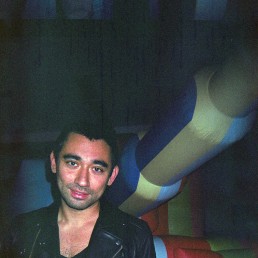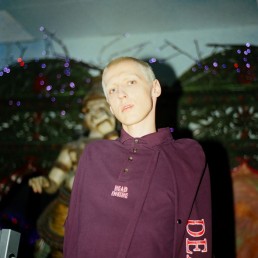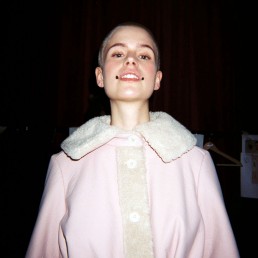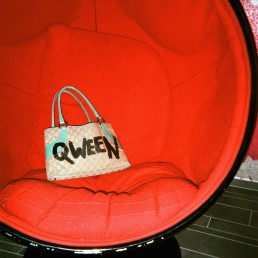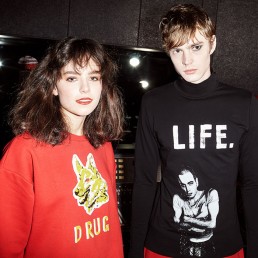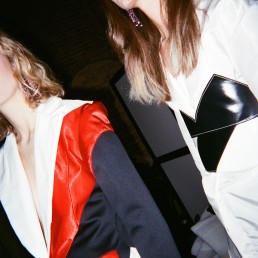For more than two decades, Jean-Benoît Dunckel has explored the dark soundscapes of electro pop as one half of the iconic French duo Air and in a more romantic, darker turn with his solo projects under Darkel. With minimal lyrics written in haiku like prose, where do modern sounds meet furthering the artistic expression in a world cluttered with soundbites? In the world of Darkel.
You are a classically trained pianist. Tell us about when you were first introduced to the synth. What could you explore and how did it evolve for you?
I went to the conservatory and always liked playing piano, and when you play piano the synthesizer is always very mysterious. It is a different sound and seems easy play, when in fact it isn’t easy at all with the programming and all that. The synth has their own sound, their own soul; it’s a whole different job.
I went to a supermarket once and there were these cheap Bontempi keyboards with a bass pedal and rhythm box, I just thought they were great. I used to play Enola Gay all the time from OMD on the Bontempi. I loved the riff of this song.
That’s when you started to explore the electronic sound?
Later, when I was around fourteen hanging around with friends at the café that’s when I met Nicolas Godin (of AIR) who already had some equipment. I just started recording around that time and I would go over to Alex Gopher to record who had equipment, synths, and everything. Alexis was one of the contemporaries of the “French Touch”. He taught me how to record sounds. Then I started to buy my own equipment, starting with a four track.
You create new sounds with a synthesizer. Do you think you have destroyed the way music was supposed to be heard or composed in order to create something new?
Music is infinite, while synths bring us new sounds it’s very convenient as you can create a piece very fast. You can also work on other instruments through synthesizers like the voice which can be filtered or morphed. The sounds of the synth are the sounds of the future. You can also make rhythms and synchronize them together. Nowadays you can just plug in to the computer and find some incredible sounds.
Is that something you keep exploring?
Yes, but always with real acoustic and percussion sounds that are then mixed like drums mixed with a beat box for example and of course the piano, lots of acoustics, glockenspiels, etc.
So when you don’t find the right plugging sometimes you turn to real instruments to create a sample?
Exactly, I think I have used only one or two plug-in sounds in my life. It’s mostly hardware synthesizers. My interest in plug-ins is really recent because I didn’t believe in it, I thought they trumped the sound, and didn’t go with the quality that I wanted.
The richness of the sound is important to you?
Yes it is, very important. Now I can determine if it’s a CD sound or not. Whatever formats I record in I know the difference given the texture of the sound.
You have lots of elements of classical music on your new album. Do you think classical music can be used to change contemporary music?
Yes, to me music is kind of like a DNA molecule. You have to find the sequence that existed before. Music is in constant evolution, like human DNA and so the contemporary music is born from the classical. I play, I listen and I create classical music. I need to be inspired by it to discover the sound, the harmony, the writing in what I do, in terms of chords. My only chance musically is the harmony. I know the harmony a little, and I can hear it, or not, when I listen to productions of different bands.
One day Olivier Messiaen or Jazz will be considered classical music. Ravel and Debussy and other turn of the century composers are considered classical and I don’t believe they were considered as such in, say, the 30s. When the Beatles become classical, it’ll be the classical pop and it is evolution.
You studied mathematics, are there any correlations with music? Do you approach the creative process as a mathematician?
Sometimes I see it as mathematical functions. I see a note or a sequence of notes and use them through a function to transform them into something else. So you can have this mathematical approach. Modulation also is mathematical. When the tunes changes, one tone, one half-tone… I see this as a vectorial transmission. The whole writing process can be influenced by this vision of mathematics. Rhythm is mathematical, it’s a division of time and harmony is a spectral division of an interval between two notes.
Lots of musicians do not see music as logical as you do.
1+1 makes 2. And it is far more beautiful than 1+1 makes 3.
You have been in the music industry for twenty years. How do you see it evolve, is there a future for computers in music, or music made with analogical instruments?
More people listen to music nowadays, thanks to portable technology. Plus, with the computer being the main support for music, there is a strong connection to videos as well creating new experiences, the music, the sound. I’ve seen concerts recently, “les frigos” they call it near the Wanderlust (in Paris), where you have concerts of contemporary music, with videos, sounds and moving images interacting. HD too will change the industry of music and the production of it, because we are going to have an awesome sound in our smartphones, which, I believe will boost the music industry, at the financial and creative levels.
So, you believe we’re at a breaking point, or a changing point in the music industry?
I think the changing point has been reached, in the music world. There is a whole new dynamic now, thanks to Internet, the HD… New bands come and they have learned to exploit their music differently. They play more live, and they know better how to manipulate the social networks.
I believe the noughties were a revolution, because, for the first time, the artists, the musicians had their own means of production, without having to go in a studio. It changed everything, in the sound and in the music business. Then in 2010, they reach the means for distribution, through Internet. They are much freer than ever before.
But Internet isn’t a very selective tool…
But it’s a reflection of life. And life is that if there is a good enough investment by said band on Internet, its chances of making it big, and be famous are much stronger.
It is interesting because Internet has liberalized music, but there is now so much music being made that it can be difficult to find something really interesting.
Yeah, listening to the music on internet is like visiting a porn site, you never know if you get amateur or professional content. You never know.
On a personal note, what are the directions you wish to explore now? You want to keep on the trail of your last album with Air?
Well, I’m working on a pop album that’ll come out in a year, under my name, JB Dunckel, a concept album, with pop tracks, on which I sing. The subject of it will be transhumanism.
One of our subjects.
I love science, and it’s a subject that opens a lot of perspectives; immortality, well-being, to live forever, which is slowly coming to us. But I don’t think that’s possible, imagine, 150,000 humans die every day. What if they suddenly stop dying? Our planet would crack from too many people.
But immortality, transhumanism can be beneficial with the results of all the research linked to aging, if only for learning new things about healing people. I’m right at the perfect age for this; I’m a transhumanist, neither old nor young.
How do you spread transhumanism?
I take photos. Trans-humanist photos. Well, people take photos of me and I adopt a trans-humanist look.
And in music?
Well, in music, there will be morphing, changes in tones, in voices, you see? Voices, at the same time, male and female, human and machine…
Voice being the only human element in music.
No, everything is human when I make music. Synths are played. Voice is the only biological element. People ask me if I change my voice, but no, that is how I sing. I have a girl’s voice, naturally androgynous with a super French accent, and a light stutter.
How do you see this connection between music and fashion? Do you see it as beneficial for both industries?
Fashion has some means of production, distribution too, and sometimes the music created for fashion shows are very interesting. There is a research, an “avant-gardisme”, and that’s what’s great, this constant research in music and fashion.
Musicians are also sometimes models that influence fashion, sometimes involuntarily. The best way to be fashionable is to have your own strong style. Like in music really. If I want to make a hit, I cannot wait on radios to play it enough. It has to predict what will happen.
Interview and photography by Andriy Zozulya-Davidv, styling by Anna Barr
Many thanks to Pablo Mendy, Carolina de Medeiros Cosme, Pavla Mihaleff and Y-Project

